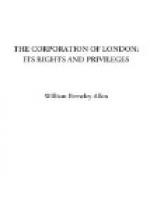The reign of Edward I. was rendered memorable for the convocation of the first parliament of the freely-elected representatives of the people, for the purpose of voting the supplies necessary for the conduct of public affairs. Previously to this, grants of money were usually obtained through the personal influence of the barons over the cities and towns held in demesne. The burgesses, however, did not sit with the knights of shires, but apart by themselves, and, through loyalty or obsequiousness, assessed themselves in a contribution nearly one third greater than that granted by the barons and knights. The convenient precedent was not overlooked, and it became henceforth customary to expect the like liberality from subsequent parliaments. At this period, also, the principal divisions of the city were first denominated wards; these wards were presided over by an alderman, assisted by a council chosen by the inhabitants of each division. In the twelfth year of his reign, Edward, incensed by what he considered the disrespectful conduct of the civic magistrates, disfranchised the city, and governed it for twelve years through means of a custos. The experiment, however, did not answer, and the king was glad to restore the liberties of the City on payment of a heavy fine. At a later period, the mayor and sheriffs successfully resisted a second attempt to infringe on the privileges of the citizens. Under the second Edward, London continued to maintain its ascendancy over all the other cities in the kingdom, and it was now for the first time authentically ordained, that no person should be held to enjoy civic freedom unless he were a member of some trade or “mystery,” or admitted by full assent of the commonalty assembled.




